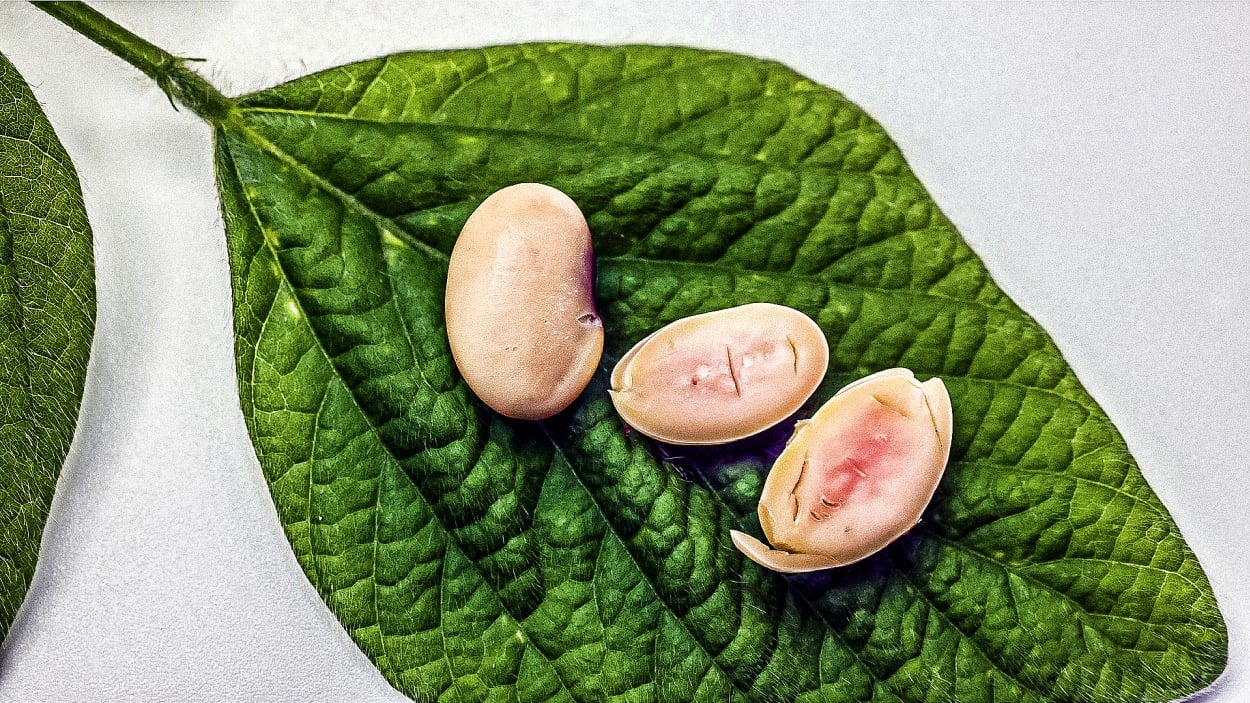November 28, 2025 | 02:49 GMT +7
November 28, 2025 | 02:49 GMT +7
Hotline: 0913.378.918
November 28, 2025 | 02:49 GMT +7
Hotline: 0913.378.918

Photo: Moolec
If you cut open a new type of soybean, the inside is pink. It’s the first demonstration of a new type of agriculture: The soy DNA has been genetically engineered to integrate DNA from a pig.
“At the end of the day, we’re replicating what nature does in an animal inside a plant,” says Gastón Paladini, CEO and cofounder of Moolec, the startup that developed the soybean. The company plans to extract porcine protein from the soybeans and sell it to food manufacturers to help make animal-free meat alternatives that taste like the real thing.
“We looked at the key animal proteins that provide texture, flavor, and nutrition,” says Amit Dhingra, the startup’s chief science officer. “We know the DNA sequence of these proteins.” Through genetic engineering, the team tweaked the nucleus of the soybean plant so that it can produce the same proteins. The crop can be grown on farms, like any other soybeans.
The process, which the company calls “molecular farming,” is a more affordable way to make real animal protein—without raising and slaughtering animals—than “cell-cultivated” meat, where cells from a living animal are grown in steel tanks. Cultivated meat (aka lab-grown meat) is also energy-intensive to produce; one recent study suggests that its carbon footprint could actually be worse than that of beef. The new process is also simpler to scale up than precision fermentation, an approach that uses microbes to produce animal protein and requires specialized infrastructure.
“The beauty of Moolec’s technology is that actually the only thing that we are modifying is just the seed, at the very beginning of the value chain itself, and the biology and the current infrastructure does the rest,” says Paladini. That could make it possible to reach price parity with traditional animal protein. Farmers already grow 350 million metric tons of soybeans a year, and the new seeds could simply replace some of that crop. (More than three-quarters of current production is grown for animal feed, and some of that soy farming is contributing to deforestation; if animal protein could come straight from plants, it could dramatically reduce land use and pressure on nature.)
Of course, it’s possible to use ordinary soybeans to make fairly realistic plant-based meat. But it also requires a long list of other additives. Using proteins that are identical to what’s found in an animal can lead to a product that’s more likely to convince meat lovers to make the switch, with fewer ingredients. A handful of other startups are using the same approach to make animal proteins, including Nobell, a company using soybeans to produce dairy proteins for cheese.
Moolec recently demonstrated that its platform—which it has dubbed “Piggy Sooy”—can make soy seeds that contain between 5% to 26.6% porcine protein. That’s four times more than the team initially expected. To be commercially viable, they knew that at least 5% of the total protein would need to be pig protein. Producing the protein in soy, rather than raising a pig, means that the carbon footprint could be around 60 times lower.
Now, the company plans to scale up production for more testing, while it simultaneously works on formulating protein powders, extracted from the plants, that it will sell to food producers. It’s also working on multiple other proteins both for pork and beef; each soybean variant produces one specific protein. The first ingredients could come to market in four or five years.
Paladini grew up in South America in a family that has run a large meat production company for generations. “I’m very well acquainted with the traditional meat value chain, and I’m very well acquainted with the sustainability issues of the traditional value chain,” he says. “I truly believe that we need to find an alternative solution to produce animal proteins.”
It’s not clear how consumers will react to the new ingredients, though the company points out that more than 95% of soybeans grown in the U.S. are already genetically engineered—just in less obvious ways. “The consumer is more likely to embrace the use of science in food knowing that the final product tastes good and is nutritious without the guilt,” Paladini says. Ultimately, he says, if it’s possible to produce the same protein, at the same cost, in a plant rather than a slaughterhouse, why not choose the plant?
(fastcompany)

(VAN) A new study reveals how the simultaneous effects of ocean acidification, salinity and loss of oxygen are making the world more fragile.

(VAN) Hopes are growing that the creation of the first 3D turkey gut model could be a turning point in the battle against the virulent blackhead disease.

(VAN) Tyson, America’s biggest meat supplier, plans to shutter one of its largest beef processing plants as the industry continues to struggle with low cattle supplies and political pressure from Washington.

(VAN) New FAO study shows how digital solutions are empowering farmers and fishers to prevent losses and build resilient agrifood systems.

(VAN) Brazil's COP30 presidency pushed through a compromise climate deal on Saturday that would boost finance for poor nations coping with global warming but that omitted any mention of the fossil fuels driving it.

(VAN) Poultry farmers in the UK have been warned that they could face one of the worst winters yet for bird flu.

(VAN) Prices of main-crop paddy have risen sharply, with jasmine rice hitting 16,100 baht per tonne — the highest level in years.